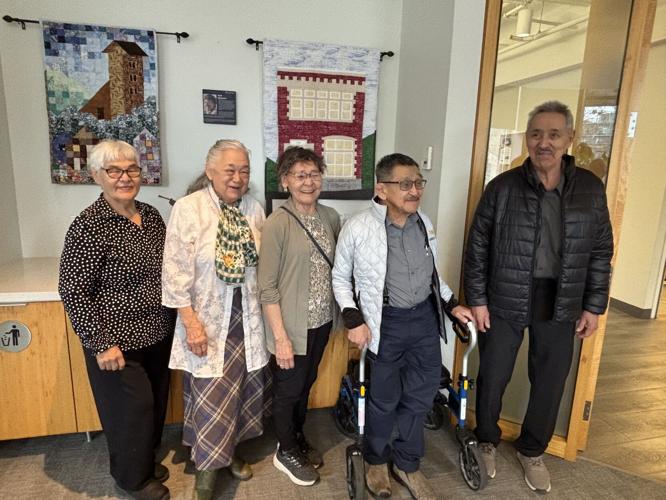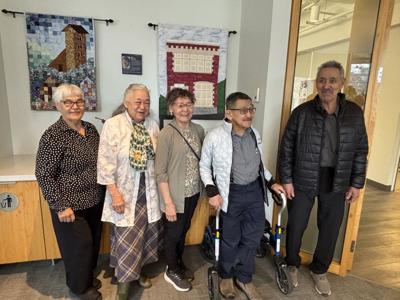The biggest mistake southern Canada makes about the Arctic is thinking it belongs to the past. Too often, the Far North is treated as a distant chapter in our nationŌĆÖs story. A place of exploration, hardship, or romance, but not relevance.
The Arctic is not behind us. It is ahead of us, shaping our sovereignty, our security, and our future. It is on the front lines of the most critical issues facing not only Canada, but the world.
If you think this is a far-off problem for another day, you are wrong. Decisions about the Arctic are being made right now; in Washington, in Ottawa, in Beijing and in Moscow as the people who have lived there for thousands of years watch the world close in.
The Arctic is not only a Canadian treasure. It is a front-line. And like any front-line, it is about more than military presence. It is about community strength, cultural preservation and the ability to thrive in one of the harshest and most breathtaking environments on Earth.

In April, Hannah Thibedeau interviewed David Akeeagok, an Inuk politician and from Grise Fiord, Nunavut in Iqaluit. He spoke about how his family was forcibly relocated, ŌĆ£as human flagpolesŌĆØ from Northern Quebec to Grise Fiord.╠²
Supplied PhotoThis past year, when I became the host of a podcast dedicated to bridging the gap between CanadaŌĆÖs north and south, I thought I would be simply gathering and sharing stories from Arctic communities. Ten episodes later, I see it differently. What IŌĆÖve been recording is a front-row seat to one of the most important and least understood chapters in CanadaŌĆÖs story.
IŌĆÖve sat with elders who have lived both in igloos and on the internet, their voices carrying centuries of survival in every word. IŌĆÖve spoken with young leaders shaping a future that blends tradition and innovation, including one who calls NHL hockey games in Inuktitut. The fastest game on ice, broadcast in a language born of the ice. ThatŌĆÖs not just hockey. ThatŌĆÖs pride and proof that language can hold youth and Elders in the same space.
But more than a series of interviews, it quickly became clear to me how much we could all learn from our northern neighbours. Not about the past, but about how to maximize CanadaŌĆÖs full potential for the future.
The urgency is clear. In 2024, Donald Trump won a second term as U.S. president. His rhetoric on NATO, defence spending and his expansionist vision on annexing Greenland and Canada signals a challenge to Arctic sovereignty. Trump has already forced Canada to think differently and spend differently when it comes to protecting our land, even those in the Far North.
On his first domestic trip after being elected prime minister this spring, Mark Carney said, “Arctic sovereignty is a strategic priority of our government.”
Carney has since pledged to spend $6.7 billion on a radar system in partnership with Australia to monitor Arctic airspace at long range, to boost Canadian Armed Forces’ year-round presence in Canada’s north at a cost of $420 million and to invest $253 million to develop Nunavut’s critical infrastructure.

An abandoned boat on a beach on Frobisher Bay, in the community of Apex, Nunavut, has become something of a tourist attraction.╠²
Supplied PhotoThese Arctic╠²investments were framed within the context of “escalating tensions,” including Trumps talk of annexation and a trade war.
But urgency is nothing new to Inuit. The Far North has been built on determination. Not the glossy, Instagram-friendly version, but the kind that survives relocations, outlasts colonial policies and persists when progress is measured in decades, not election cycles.╠²
I met people fighting to keep their language alive against the relentless pull of English. Entrepreneurs building businesses, not just to make a living, but to nourish both their economy and the spirit of their communities. Teachers trying to teach kids who arrive without breakfast, miss too many days, and are not given the same resources than in the south, but who keep fighting because no child in this country should be denied the education that others take for granted. ┬Ł┬Ł┬Ł┬ŁInuit adapting centuries old knowledge, to meet challenges their ancestors could never have imagined.
If you have never been to Nunavut, it is easy to imagine it as distant, quiet, untouched. It is none of those things. It is alive and complex. And it is at the centre of some of the most consequential conversations of our time, from national defence to food security, from economic development to climate resilience.
I covered the dark history of the and Cold War relocations of Inuit families, which serve as a warning of what can be justified in the name of sovereignty. I had deep conversations with Inuit business leaders, for whom economic self-determination isnŌĆÖt some abstract idea, but a daily practice.
Then there were the elders. Before I met them, even as a journalist with a deep respect for the power of words, I never fully understood how language could be the backbone of culture. For them, it is memory, identity, survival and future, all bound together. Losing it is not just losing words. It is losing a way of seeing the world.
The “Arctic Edge” began as a podcast. What it became was a record of this moment and a clarion call for CanadaŌĆÖs evolution, from voices that too often fall outside of the national conversation; voices that should be shaping how we think about our country, our allies, and our responsibilities.
What I once thought were stories from the edges of Canada, I now see as stories at the core of who we are.
Error! Sorry, there was an error processing your request.
There was a problem with the recaptcha. Please try again.
You may unsubscribe at any time. By signing up, you agree to our and . This site is protected by reCAPTCHA and the Google and apply.
Want more of the latest from us? Sign up for more at our newsletter page.





























To join the conversation set a first and last name in your user profile.
Sign in or register for free to join the Conversation